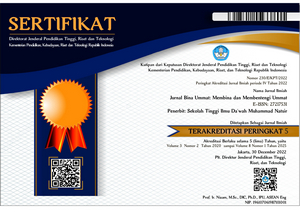ABUJAMIN ROHAM'S DA'WAH METHOD IN FACING CHRISTIANIZATION IN INDONESIA
DOI:
https://doi.org/10.38214/jurnalbinaummatstidnatsir.v6i1.175Keywords:
da'wah, christianization, method, apostasyAbstract
Research Objective: Knowing Abujamin Roham's da'wah method in facing Christianization in Indonesia. Research Method: Qualitative. Research Results: Manhaj or da'wah method used by Abujamin Roham is divided into two categories, namely; (1) binȃan da'wah with the aim of fostering or building the Islam of the Indonesian Muslim community, among the da'wah carried out in this category are; writing about Islamogy and tausiyah/recitation, as well as silaturahim. (2) the proselytizing of dhifȃan with the aim of fortifying Muslims from the misguided enemies of Islam. Among his da'wah activities are; writing rebuttals, discussions or scientific debates and through the formation of the FAKTA Team. Conclusion: based on the results of analysis of research data, it can be concluded that Abujamin Roham's da'wah manhaj in the face of Indonesia's apostasy and Christianization efforts is da'wah through; :(1) Writing (2) Scientific discussion or debate (3) Silaturahim (4) Lecture, tausiyah or recitation (5) Formation of the FAKTA Team.
Published
Versions
- 2025-01-08 (2)
- 2023-06-13 (1)
Issue
Section
This work is licensed under a Lisensi Creative Commons Atribusi 4.0 Internasional.
Authors who publish with this journal agree to the following terms:
- Authors retain copyright and grant the journal right of first publication with the work simultaneously licensed under a Creative Commons Attribution License that allows others to share the work with an acknowledgment of the work's authorship and initial publication in this journal.
- Authors are able to enter into separate, additional contractual arrangements for the non-exclusive distribution of the journal's published version of the work (e.g., post it to an institutional repository or publish it in a book), with an acknowledgment of its initial publication in this journal.
- Authors are permitted and encouraged to post their work online (e.g., in institutional repositories or on their website) prior to and during the submission process, as it can lead to productive exchanges, as well as earlier and greater citation of published work (See The Effect of Open Access).




